大一上英语笔记整理
- 格式:doc
- 大小:38.00 KB
- 文档页数:14
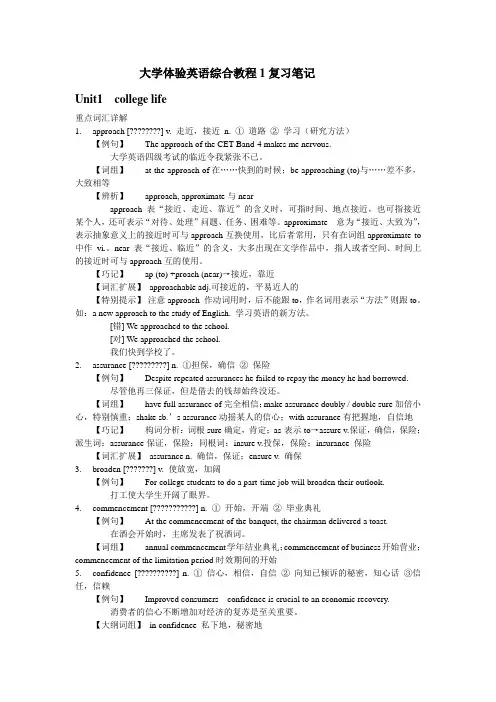
大学体验英语综合教程1复习笔记Unit1 college life重点词汇详解1. approach [????????] v. 走近,接近n. ①道路②学习(研究方法)【例句】The approach of the CET Band-4 makes me nervous.大学英语四级考试的临近令我紧张不已。
【词组】at the approach of在……快到的时候;be approaching (to)与……差不多,大致相等【辨析】approach, approximate与nearapproach 表“接近、走近、靠近”的含义时,可指时间、地点接近,也可指接近某个人,还可表示“对待、处理”问题、任务、困难等。
approximate 意为“接近、大致为”,表示抽象意义上的接近时可与approach互换使用,比后者常用,只有在词组approximate to 中作vi.。
near 表“接近、临近”的含义,大多出现在文学作品中,指人或者空间、时间上的接近时可与approach互的使用。
【巧记】ap (to) +proach (near)→接近,靠近【词汇扩展】approachable adj.可接近的,平易近人的【特别提示】注意approach 作动词用时,后不能跟to,作名词用表示“方法”则跟to。
如:a new approach to the study of English. 学习英语的新方法。
[错] We approached to the school.[对] We approached the school.我们快到学校了。
2. assurance [?????????] n. ①担保,确信②保险【例句】Despite repeated assurances he failed to repay the money he had borrowed.尽管他再三保证,但是借去的钱却始终没还。
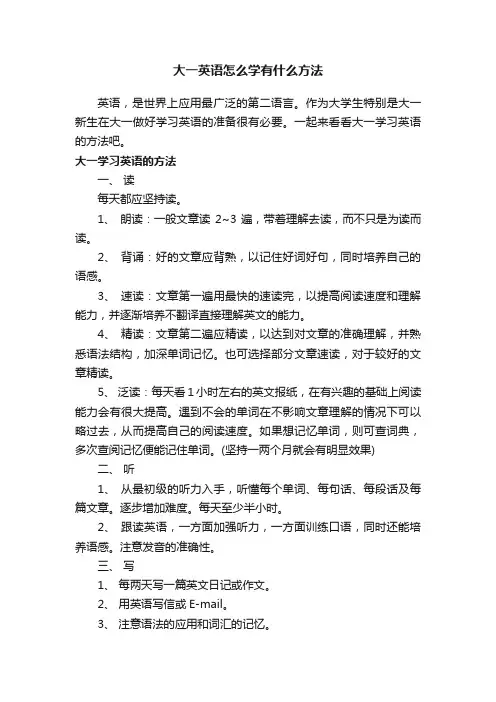
大一英语怎么学有什么方法英语,是世界上应用最广泛的第二语言。
作为大学生特别是大一新生在大一做好学习英语的准备很有必要。
一起来看看大一学习英语的方法吧。
大一学习英语的方法一、读每天都应坚持读。
1、朗读:一般文章读2~3遍,带着理解去读,而不只是为读而读。
2、背诵:好的文章应背熟,以记住好词好句,同时培养自己的语感。
3、速读:文章第一遍用最快的速读完,以提高阅读速度和理解能力,并逐渐培养不翻译直接理解英文的能力。
4、精读:文章第二遍应精读,以达到对文章的准确理解,并熟悉语法结构,加深单词记忆。
也可选择部分文章速读,对于较好的文章精读。
5、泛读:每天看1小时左右的英文报纸,在有兴趣的基础上阅读能力会有很大提高。
遇到不会的单词在不影响文章理解的情况下可以略过去,从而提高自己的阅读速度。
如果想记忆单词,则可查词典,多次查阅记忆便能记住单词。
(坚持一两个月就会有明显效果)二、听1、从最初级的听力入手,听懂每个单词、每句话、每段话及每篇文章。
逐步增加难度。
每天至少半小时。
2、跟读英语,一方面加强听力,一方面训练口语,同时还能培养语感。
注意发音的准确性。
三、写1、每两天写一篇英文日记或作文。
2、用英语写信或E-mail。
3、注意语法的应用和词汇的记忆。
四、语法1、从基础到高级,掌握每一个语法点,并作详细笔记。
笔记所记的都是自己所会的,直到把所有语法细节都掌握。
2、对于不熟悉的语法知识点应反复复习运用,直到掌握为止。
五、词汇1、每天记忆10——15新单词,并复习前一天的旧单词。
对于生疏的旧单词,可记录下来,安排适当时间记忆。
2、所有单词记忆完一遍之后紧接着再记一遍,三四遍并不为多。
重复是记忆单词的最好方法,也是很多记忆的根本方法。
3、结合例句记忆单词,效果最佳。
记忆单词应注意力集中,六、练习1、大量的练习可以巩固所学知识。
2、通过练习可以提高阅读理解能力,增加词汇量,加强对语法的掌握。
觉,这不是能教会的,需要你自己摸索。
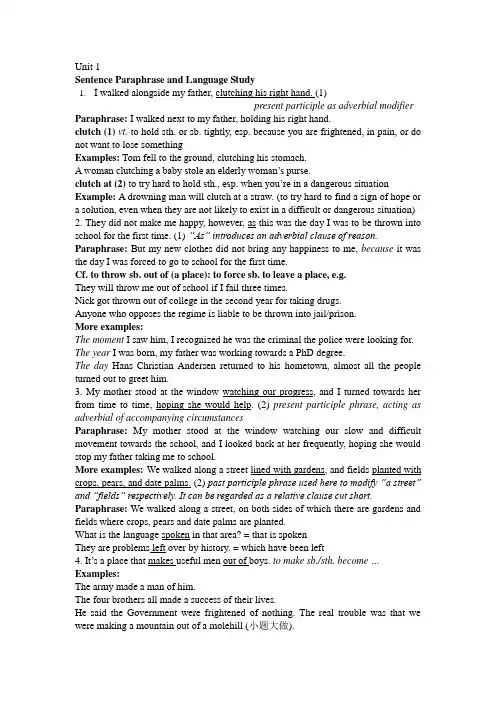
Unit 1Sentence Paraphrase and Language Study1.I walked alongside my father, clutching his right hand. (1)present participle as adverbial modifier Paraphrase: I walked next to my father, holding his right hand.clutch (1)vt. to hold sth. or sb. tightly, esp. because you are frightened, in pain, or do not want to lose somethingExamples: Tom fell to the ground, clutching his stomach.A woman clutching a baby stole an elderly woman’s purse.clutch at (2)to try hard to hold sth., esp. when you’re in a dange rous situation Example: A drowning man will clutch at a straw. (to try hard to find a sign of hope ora solution, even when they are not likely to exist in a difficult or dangerous situation)2. They did not make me happy, however, as this was the day I was to be thrown into school for the first time. (1)“As” introduces an adverbial clause of reason. Paraphrase: But my new clothes did not bring any happiness to me, because it was the day I was forced to go to school for the first time.Cf. to throw sb. out of (a place): to force sb. to leave a place, e.g.They will throw me out of school if I fail three times.Nick got thrown out of college in the second year for taking drugs.Anyone who opposes the regime is liable to be thrown into jail/prison.More examples:The moment I saw him, I recognized he was the criminal the police were looking for. The year I was born, my father was working towards a PhD degree.The day Hans Christian Andersen returned to his hometown, almost all the people turned out to greet him.3. My mother stood at the window watching our progress, and I turned towards her from time to time, hoping she would help. (2)present participle phrase, acting as adverbial of accompanying circumstancesParaphrase: My mother stood at the window watching our slow and difficult movement towards the school, and I looked back at her frequently, hoping she would stop my father taking me to school.More examples:We walked along a street lined with gardens, and fields planted with crops, pears, and date palms. (2) past participle phrase used here to modify “a street” and “fields” respectively. It can be regarded as a relative clause cut short. Paraphrase: We walked along a street, on both sides of which there are gardens and fields where crops, pears and date palms are planted.What is the language spoken in that area? = that is spokenThey are problems left over by history. = which have been left4. It’s a place that makes useful men out of boys. to make sb./sth. become …Examples:The army made a man of him.The four brothers all made a success of their lives.He said the Government were frightened of nothing. The real trouble was that we were making a mountain out of a molehill (小题大做).5. I was not convinced. convince vt. to make sb. feel certain that sth. is true Examples:I couldn’t convince him of his mistake. How can I convince you of my sincerity?I managed to convince them that the story was true.a convincing argument convincing evidence6. I did not believe there was really any good to be had in tearing me away from my home and throwing me into the huge, high-walled building. (5)gerund as the object of the prepositiontear sb. away from: to (make sb.) leave a place unwillingly because one has to Paraphrase: I didn’t think it was useful to take me away from home and put me into that building with high walls.More examples:1) We had difficulty in finding a parking lot. 2) I have no objection to hearing your story again.3) I’m not keen on gambling. I’m too afraid of losing. 4) There’s no point in waiting.There’s no good to be had in doing sth.=It’s no good/use doing sth. or There is no good/use doing sth.: It’s not useful to do sth.Examples:It’s no good crying spilt milk. (proverb)It’s no use talking to him.There is no good to be had in buying a boat when you don’t have enough spare time to use it.I don’t see there is any good to be had in downsizing the company.Related phrases:it is no (not much) goodit is no (not any, hardly any, little) useit is useless + doingit is not the slightest useit is worth (worthwhile)there is no (good, use)Example: There is no good denying that women are playing an important role in the world today.to tear oneself/sb. away from: to (make sb.) leave a place or a person unwillingly because one has to.Examples:Can’t you tear yourself away from the TV for dinner?The young artist couldn’t tear himself away from da Vinci’s Mona Lisa.7. Vast (1)a. extremely large; spreading a great distanceExamples:The vast plains of this country spread for hundreds of miles.He is very valuable to his employer because of his vast experience in the business. vast (2)Examples:The group of actors was brought from New York to London at vast expense.The refugees came across the border in vast numbers.The vast majority of young people don’t take drugs.8. I hesitated and clung to his hand, …to hold tightly; not release one’s grip on Examples:The little child clung to his mother for comfort.Some of the victims of the fire climbed out of the building, clung to the window ledges for a minute or two and then dropped to their death a hundred feet below. Collocations:cling to the belief; cling to the hope; cling to one’s own viewcling to the habit; cling to one’s possessions9. You will find me waiting for you when it’s time to leave. (7) find + obj + v-ing (object complement)Paraphrase: I’ll come to fetch you when school is over. I’ll be waiting for you here at the gate.More examples:1) When I entered the room, I found him reading something aloud.2) I found a tree lying across the road.3) If she catches you reading her diary, she’ll be furious.4) His remark left me wondering what he was driving at.5) The words immediately set us all laughing.Note: Thi s structure is very common in verbs like “see, hear, feel, watch, notice.”10. Some of the children burst into tears.burst into:to begin, suddenly and/or violently, to cry, laugh, sing, etc. Example: Aunt Annabel, who has been nervous and jumpy lately, suddenly burst into tears.Collocations:As the comic got into his stride, the audience burst into hoots of laughter/a guffaw. The aircraft crashed into the hillside and burst into flames.The orchards seemed to have burst into blossom overnight.The entire hall burst into thunderous cheers/applause.Everyone on the bus burst into song as we got closer to home.Similar expressions:As they left the club the revellers broke into song/loud curses.I mentioned the incident later to a tailor friend and he burst out laughing/crying.11. … from each floor we were overlooked by a long balcony roofed in wood. (11) Paraphrase:… on one side of the courtyard was a building with a long wood-roofed balcony on each floor where we could be seen. Or: … from the balcony on each floor of the building people could see the pattern into which we formed.overlook: vt. a. to have a view of sth. from above; b. to fail to see or notice; pay no attention toExamples:Our room overlooks the ocean. My garden is overlooked by the neighbours. I’m afraid I overlooked your name; I’ll add it to the list immediately.I’ll overlook your mistake this time.12. I had never imagined school would have this rich variety of experience. Paraphrase: I had never thought life at school would be so colorful and interesting. variety (1) n. number or range of different thingsExamples:The T-shirts are available in a wide variety of colors.The students come from a variety of different backgrounds.variety (2) n. quality of not being the same, or not being the same at all times Examples:There was little she could do to add variety to her daily routine.She didn’t like the work, because it lacked variety; she was doing the same things all the time.Variety is the spice of life. (=Doing a lot of different things, meeting different people, etc. is what makes life interesting.)Examples:1) Customs vary from country to country.2) Human nature, in all its many and varied forms, is very complex and hard to understand.3) Of all the various ways of cooking an egg, I like boiling best.4) There are wide regional variations in house price.5) There are too many variables in the experiment to predict the result accurately.6) Consumers’ preferences are so variable that planning is almost impossible.13. We saw a globe of the Earth, which revolved and ….v. a. to spin around or make sth. spin around, on a central point; b. (fig.) to think aboutExamples:The metal disc revolves at high speed. The earth revolves round the sun.The story revolves around a young girl who runs away from home.He revolved the matter in his head/mind.18. It was not all a matter of playing and fooling around. (15)all: completely; fool around: to waste time instead of doing sth. that you should be doingParaphrase: What we did at school wasn’t just playing and wasting time doing nothing useful.a matter of: a subject/situation that involves sth.Examples:Learning is a matter of seeing much, suffering much and studying much.The King’s mental state was becoming a matter of c oncern.Personally I can’t stand rock music, but I suppose it’s all a matter of opinion.I can’t say which wine is best—it’s a matter of personal taste.fool around/about: to waste time behaving in a silly wayExamples:He spent the whole afternoon just fooling around.Stop fooling around otherwise you’ll never amount to anything.Cf. He noticed a strange-looking person hanging about the bus stop.I hung around the station for an hour but he never showed up.The children lingered on at the zoo until the closing time.14. Rivalries could bring about pain and hatred or give rise to fighting.bring about: to make sth. happenExamples:Computers have brought about many changes in workplace.I offered to act as mediator and try to bring about a reconciliation between the two parties.That unpopular measure finally brought about the downfall of the government.give rise to: to be the reason why sth. esp. sth. bad or unpleasant happens Examples:Two phenomena are giving rise to world-wide concern—mass unemployment and mass migration into cities.Most people argued that poverty had given rise to the crimes in the town.15. … she would resort to physical punishment.resort to: to make use of ; to turn to sth. (esp. sth. bad) as a solutionExamples:There is no righ t to resort to violence when you don’t get your way.Terrorists resorted to bombing city centers as a means of achieving their political aims.Differences and disputes should be resolved through dialogue and negotiation rather than by resorting to force or terrorist actions.16. In addition, the time for changing one’s mind was over and gone and there was no question of ever returning to the paradise of home. (16) no possibility of Paraphrase: Besides, it was impossible for us to quit school and return to the good old days when we stayed home playing and fooling around all day. Our childhood was gone, never to come back.There is no question (of sth. happening / sb. doing sth.): There is no possibility. Example: There is no question of their dismissing you at the moment.17. Nothing lay ahead of us but exertion, struggle, and perseverance. (16) Paraphrase: We would have to do our best and keep working very hard until we finished school. This is what I imagined our school days would be like. Or: The kind of life that was waiting for us at school would be full of exertion, struggle and perseverance.Nothing but: onlyRight now he thinks about nothing but his research. She ate nothing but an apple for lunch.18. Those who were (relative clause modifying “those”)able took advantage of the opportunities for success and happiness that presented themselves. (relative clause modifying “opportunities”) (16)Paraphrase: If there came opportunities, capable students would seize them to achieve success and happiness.take advantage of: to use a particular situation to do or get what you wantExamples: I took advantage of the weather to paint the shed.Don’t lend them the car—they’re taking advantage of you!More phrases:For certain types of work wood has/gains/wins advantages over plastic.New tax regulations had given them an advantage over their commercial rivals.You have the advantage of me. Candidates with computer skills will be at an advantage.Do take more exercise. It is to your advantage.present (1)v. (reflex) to appear; attendExamples:When the chance to study at Harvard presented itself, I jumped at it.He was ordered to present himself at the chairman’s office at nine o’clock next morning.present (2) v. a. to give; offer; put forward; submit; b. to show or reveal; c. to put on; produce (a play)Examples:David’s manager presented him with the award for best sales in the region.His sudden resignation presents us with a tricky situation.The National Theatre is presenting “King Lear” next month.19. I looked around bu t found no trace of my father.trace (1) n. a. a small sign that shows that sb.or sth. was present or existed; b. very small amountIt vanished/disappeared/without trace. Petra’s lost all trace of her German accent. Age has left its traces on his face. There are traces of poison in the man’s blood.A mere trace of smile passed over her face.trace (2)v. a. to follow the marks to find sb. or sth.; b. to find the origin of sth.c. to study or describe the history, development or progress of sth. Examples:She had given up all hope of tracing her missing daughter.The style of these paintings can be traced back to early medieval influences.His book traces the changing nature of the relationship between men and women. 20. How did these hills of rubbish find their way to cover its sides? (17)to arrive or get to a placeParaphrase: How did the street come to be covered with so much rubbish on both sides? Where did they come from?find one’s way to:to arrive or get to a placeExamples:After being lost for two days, the little dog finally found its way back to its owner’s house.Because of the dense fog, the traveller couldn’t find his way to his camp.Related phrases:make one’s way to/towards the door bow her way out of the roompush her way out of the hall shoulder her way through the crowdworm his way into the organization beg her way back homeinch one’s way up the mountain21. Here and there stood conjurers showing off their tricks or making snakes appear from baskets. (17) an inverted sentence due to long subjectParaphrase: Conjurers stood everywhere. They were showing off their tricks or making snakes appear from baskets.More examples: 1) There are some exceptions to this reaction.2) Were there no air on the earth, there would be no life on it. 3) There goes the bell.4) In no case should we waste our time. 5) Away hurried the customers.show off: a. to attract attention to; b. to try to impress people and make them admire your abilities, achievements or possessionExamples:It was said that Mrs. Perkins only went to church to show off her new clothes.She was always at any function or gathering where her accomplishments could be shown off.Pay no attention to Susan—she’s just showing off.22. Then there was a band announcing the opening of a circus, with clowns and weight lifters walking in front. (17) “With+n.+doing” construction is used adverbially modifying “announcing”.Paraphrase: Then there was a band that was announcing the opening of a circus. The clowns and weight lifters were walking in its front.More examples:1) He stood there with a stick in his hand. (with + n. + prep.)2) Paul soon fell asleep with the light still burning. (with + n. + participle)3) She can’t go out with all these dishes to wash. (with + n. + to do)4) He was lying on the bed with all his clothes on. (with + n. + adv.)23. I was in a daze. n. a confused state of mind; v. to make (sb.) feel stupid or unable to think clearlyExamples: I’ve been wandering around in a daze all day.If someone gave you a heavy blow on the head, you would probably feel dazed.Dazed survivors staggered from the wreckage.24…, but the stream of cars would not let up.let up: a. to stop or become less strong or serious; b. to slacken one’s efforts Examples: When will the rain let up?Keep plodding away at your task, no matter how difficult it is; don’t let up on it.Unit 2Sentence Paraphrase and Language Study1.They were dreaming of golden beaches and sea tides as the grey, cold spring of New York vanished behind them.dream of/about: to imagine and think about sth. that you would like to happenExamples:1) The girl dreamed of becoming a movie star.2) Some thought it was the breakthrough scientists had dreamed of.3) He's got the sort of money that you and I can only dream about.vanish: v. to disappear suddenly, esp. in a way that cannot easily be explained Examples:1) I turned around again, the boy had vanished.2) It is a bad idea to let Tom Cruise vanish for almost an hour in the middle of his picture.3) Many species in South America have vanished completely.Cf. varnish, tarnish, furnishvarnish: to cover with 给······涂清漆1) He varnished the wooden table. 2) After he fixed the shelf, he varnished the whole to a high shine.tarnish: (esp. of metal surfaces) to lose; cause the loss of brightness (尤指金属表面)使失去光泽1) The damp atmosphere has tarnished the gilt. 2) His reputation is tarnished. furnish: to supply or provide; put furniture in1)The records furnished the information required.2)The president’s office is tastefully furnished with modern furniture.2. As the bus passed through New Jersey, …pass through: to go through a town, etc., perhaps stopping there for a short time, but not stayingExamples:1) As they passed through the flooded areas, they felt bad.2) We passed through the gates into a courtyard behind.3) We were just passing through (= travelling through a place) and thought we'd drop in to see you.pass (a place): to go past a place without enteringExamples:1) On her way to work she passed a supermarket. 2) We passed a group of students outside the theatre. 3) I pass the sports centre on the way to work.3. His fingers were stained from cigarettes …stain:v. a. to accidentally make a mark on sth. esp. one that cannot be removed; b. to change the color of sth., especially sth. made of wood, by using a special liquid (Syn. dye)Examples:1) This tablecloth stains very easily. 2) Her fingers were stained yellow from years of smoking.3) Stain the table before you varnish it.Collocations:stain sb.’s name/reputation/honor; stain with; leave a stain; blood/ink/wine stain; a stain on sb.’s character/reputation; remove/get rid of a stain; stubborn stainsExamples:1) A sudden gust of rain dashed against the red bricks that were already stained inpatches by water.2) Her fingers were stained with dirt, her nail varnish chipped.3) How do you get wine stains out of a tablecloth? 4) There was a dark red stain on the carpet.5) Water is a miraculous substance remover; it will remove probably 85 percent of all stains.5. He sat in complete silence and seemed completely unaware of the existence of the others.in+n.: to show a state or conditionunaware of: not knowing or realizing that sth. is happening or that sth. exists Paraphrase: He sat without saying anything as if he did not know there were other people around.4. …, the bus pulled into a Howard Johnson’s restaurant ….pull into: (of a vehicle) to arrive at (a station); move in towardsExamples:1) They will pull into the station at 7 sharp. 2) Let’s pull into the parking lot and have a rest.3) The train pulled into the station on the stroke of 12.Opposite—pull out:if a train pulls out, it leaves a stationExamples:1) The three-thirty is pulling out of platform four. 2) We got there just as the train was pulling out.7. The young people began to wonder about him, ….wonder about/at: to feel curious about; be doubtful aboutExamples:1) John says he didn’t do it, but I am still wondering about that.2) Sometimes I wonder about his behaviour.3) He wondered at her ability never to reveal the slightest disquiet in front of her husband.5.… she decided to engage him in a conversation.engage sb. in: to make sb. take part in sth.Examples:1) She tried to engage her roommate in a philosophical discussion.2) They spoke little about life outside the organization despite my efforts to engage them in conversation about it.3) They engaged him in a new project.6.The girl insisted that he join them. (Para. 5) subjunctive mood, "should" isdropped outinsist: demand that sth. should happenAfter the verbs expressing a command, decision, suggestion, such as decide, decree, demand, insist, move, order, prefer, propose, recommend, request, require, suggest, vote, advise, determine, desire, resolve, urge, etc, in that-clause we usu. use subjunctive mood “(should) do sth.”.More examples in ppt.7. He thanked her and retreated again into his silence.retreat into/to: to yield; move back toExamples:1) The soldiers were ordered to retreat to safer positions.2) At last we forced the enemy to retreat into the mountains from the town.3) More and more she retreated into books.Collocations:retreat into oneself 不与人交往,离群索居retreat into one’s shell 变得缄默,不愿与人接触retreat into fantasy 退避到梦幻世界8.…, and that if she can’t stand it, …stand: v. a. to bear, tolerate; b.to be or stay in a particular state or condition; c.to be proved to be true, correct, useful, etc. when testedcan't stand the heat (room)stand idle stand wear and tear (door)stand open stand up under close scrutiny stand up well to cross-checking Patterns:can't stand (sb./sth.) doing sth.can't stand to do sth.can't stand the sight/thought, etc. ofExamples: I can't stand people smoking around me when I'm eating.She can't stand to hear her parents arguing about her personal affairs.I know he can't stand the sight of me. She couldn't stand the thought of losing her children.a music stand乐谱架 a fruit stand水果摊 a stand for taxi出租汽车停车处make one’s stand clear表明立场come to a stand陷于停顿international stand国际地位standing committee/army常务委员会/常备军standing joke/jest老笑话take/make/mount a stand against sth. 反抗,抵抗9. She’s a wo nderful woman, really something—and forget about me.something: n. a thing or a person of some value or importanceExamples: He considers himself to be something, but actually he is nothing.She thinks she’s something since she won the beauty contest. Collocations: make something of yourself (= to become successful )be (really/quite) something(= spoken used to say that something is very good and impressive)there's something in/to something(= used to admit that someone's words are true or their ideas are successful, etc.)Examples: He looked like a man who might be able to make something of himself if a good woman took him in hand.Running your own company at 21 is really something.They had to concede that there was something in his teaching methods.forget about: a. to lose remembrance of; fail to keep in memory; fail to recall; b. to stop thinking or worrying about someone or something; c. not to care about or give attention to someone or something any longerExamples: She forgot all about their anniversary.Once they have money, some people forget about all their old friends.I'd completely forgotten about our bet until Bill reminded me.10. …, when I was sure the parole was coming through I wrote her again.come through: to arrive as expectedExamples: Has the train come through?We're still waiting for our exam results to come through.There is news just coming through of an explosion in a chemical factory.11. ... Soon all of them were caught up in the approach of Brunswick, looking at the pictures Vingo showed them of his wife and three children.be/get caught up in: to be completely absorbed in or get involved inExamples:I was caught up in conversation with a friend when someone knocked at the door.I am painfully aware of how we get caught up in our times and become contaminated by our own hypocrisy.I didn't want to get caught up in endless petty arguments.approach: v. to move towards or nearer to someone or somethingExamples: I heard footsteps approaching.Everyone prepared celebrations as the year 2000 approached.As I approached the forest, a hare ran out of the trees.Translation: He is hard to approach. 他很难接近。
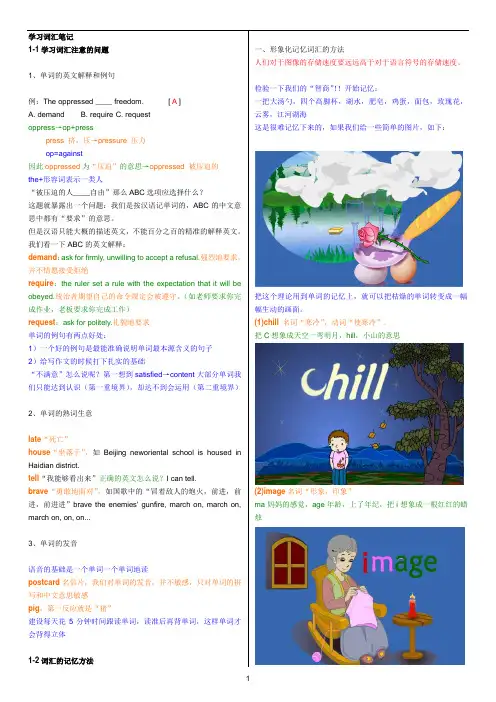
学习词汇笔记1-1学习词汇注意的问题1、单词的英文解释和例句例:The oppressed ____ freedom. [ A ]A. demandB. requireC. requestoppress→op+presspress 挤,压→pressure 压力op=against因此oppressed为“压迫”的意思→oppressed 被压迫的the+形容词表示一类人“被压迫的人____自由”那么ABC选项应选择什么?这题就暴露出一个问题:我们是按汉语记单词的,ABC的中文意思中都有“要求”的意思。
但是汉语只能大概的描述英文,不能百分之百的精准的解释英文。
我们看一下ABC的英文解释:demand:ask for firmly, unwilling to accept a refusal.强烈地要求,并不情愿接受拒绝require:the ruler set a rule with the expectation that it will be obeyed.统治者期望自己的命令规定会被遵守。
(如老师要求你完成作业,老板要求你完成工作)request:ask for politely.礼貌地要求单词的例句有两点好处:1)一个好的例句是最能准确说明单词最本源含义的句子2)给写作文的时候打下扎实的基础“不满意”怎么说呢?第一想到satisfied→content大部分单词我们只能达到认识(第一重境界),却达不到会运用(第二重境界)2、单词的熟词生意late“死亡”house“坐落于”,如Beijing neworiental school is housed in Haidian district.tell“我能够看出来”正确的英文怎么说?I can tell.brave“勇敢地面对”,如国歌中的“冒着敌人的炮火,前进,前进,前进进”brave the enemies' gunfire, march on, march on, march on, on, on...3、单词的发音语音的基础是一个单词一个单词地读postcard名信片,我们对单词的发音,并不敏感,只对单词的拼写和中文意思敏感pig,第一反应就是“猪”建设每天花5分钟时间跟读单词,读准后再背单词,这样单词才会背得立体1-2词汇的记忆方法一、形象化记忆词汇的方法人们对于图像的存储速度要远远高于对于语言符号的存储速度。
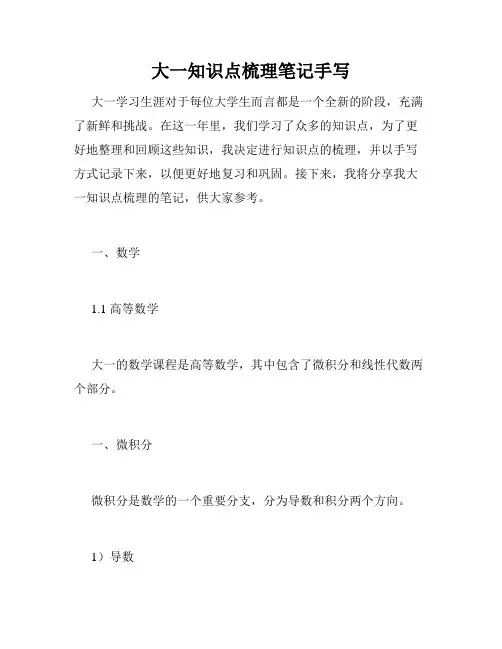
大一知识点梳理笔记手写大一学习生涯对于每位大学生而言都是一个全新的阶段,充满了新鲜和挑战。
在这一年里,我们学习了众多的知识点,为了更好地整理和回顾这些知识,我决定进行知识点的梳理,并以手写方式记录下来,以便更好地复习和巩固。
接下来,我将分享我大一知识点梳理的笔记,供大家参考。
一、数学1.1 高等数学大一的数学课程是高等数学,其中包含了微积分和线性代数两个部分。
一、微积分微积分是数学的一个重要分支,分为导数和积分两个方向。
1)导数- 导数的定义和符号表示- 基本函数的导数公式- 导数的运算法则- 高阶导数- 导数的几何意义2)积分- 不定积分和定积分的概念- 基本函数的不定积分公式- 定积分的性质和计算方法- 牛顿—莱布尼茨公式二、线性代数线性代数是数学的另一个重要分支,主要研究线性方程组和向量空间。
1)向量和矩阵- 向量的定义和运算法则- 矩阵的定义和运算法则- 矩阵的转置、逆和秩2)线性方程组- 线性方程组的定义和解的判定- 高斯消元法和矩阵的初等变换- 矩阵的列、行和秩1.2 离散数学离散数学是一门独立的数学学科,强调离散元素的集合和离散关系的结构。
主要包含了集合论、排列组合和图论等内容。
- 集合论:集合的定义、表示和基本运算- 排列组合:排列、组合和二项式定理- 图论:图的基本概念、路径和回路、连通图和树二、物理物理是自然科学的一门重要学科,主要研究物体的运动规律和物质的性质。
1.1 力学力学是物理学的一个重要分支,主要包括了牛顿运动定律和万有引力定律等内容。
- 牛顿运动定律:第一定律、第二定律和第三定律- 万有引力定律:质点之间的引力和行星运动规律- 动量和能量:动量的定义、动量守恒定律、功和能量守恒定律1.2 电磁学电磁学是物理学中的另一个重要分支,研究电荷和电磁场的相互作用。
- 静电学:库仑定律、电场的定义和性质- 磁学:磁场的定义和性质、洛伦兹力- 电磁感应:法拉第定律、安培环路定理和电磁感应的应用三、计算机科学计算机科学是一个涉及计算机系统、算法和编程的学科,大一的计算机学习主要集中在编程基础和数据结构上。
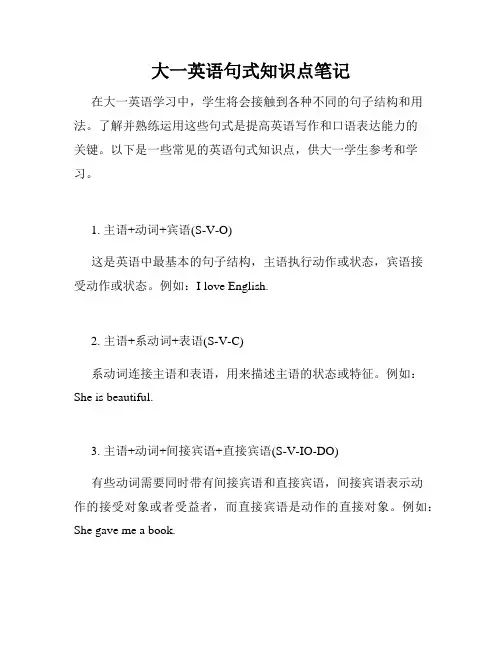
大一英语句式知识点笔记在大一英语学习中,学生将会接触到各种不同的句子结构和用法。
了解并熟练运用这些句式是提高英语写作和口语表达能力的关键。
以下是一些常见的英语句式知识点,供大一学生参考和学习。
1. 主语+动词+宾语(S-V-O)这是英语中最基本的句子结构,主语执行动作或状态,宾语接受动作或状态。
例如:I love English.2. 主语+系动词+表语(S-V-C)系动词连接主语和表语,用来描述主语的状态或特征。
例如:She is beautiful.3. 主语+动词+间接宾语+直接宾语(S-V-IO-DO)有些动词需要同时带有间接宾语和直接宾语,间接宾语表示动作的接受对象或者受益者,而直接宾语是动作的直接对象。
例如:She gave me a book.4. 主语+动词+宾语+宾语补足语(S-V-O-C)宾语补足语修饰或说明宾语,通常用来描述或补充宾语的特征。
例如:They made him their captain.5. 主语+动词+宾语+宾语补足语+to do(S-V-O-C-Infinitive)动词后面接不定式,表示将来发生的动作。
例如:We wanthim to come to the party.6. There be句型There be句型用来描述某地或某物存在或发生的情况。
例如:There is a book on the table.7. 被动语态(Passive Voice)被动语态用于强调动作的承受者或者对象。
被动语态的结构为:be动词+过去分词。
例如:The book was written by him.8. if引导的条件句if引导的条件句用来表达假设、条件或者可能性。
条件句通常由一个条件从句和一个结果从句组成。
例如:If it rains tomorrow, we will stay at home.9. 强调句强调句用于强调一个特定的人或物。
强调句的结构为:It is/was + 被强调部分 + that(who/whom)。
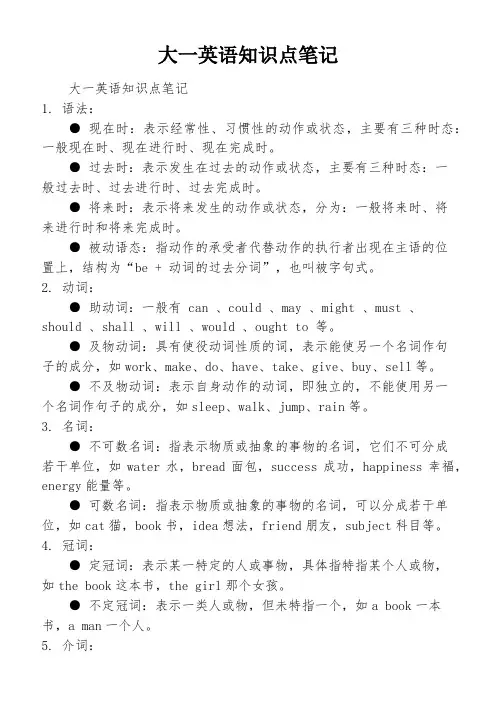
大一英语知识点笔记大一英语知识点笔记1. 语法:● 现在时:表示经常性、习惯性的动作或状态,主要有三种时态:一般现在时、现在进行时、现在完成时。
● 过去时:表示发生在过去的动作或状态,主要有三种时态:一般过去时、过去进行时、过去完成时。
● 将来时:表示将来发生的动作或状态,分为:一般将来时、将来进行时和将来完成时。
● 被动语态:指动作的承受者代替动作的执行者出现在主语的位置上,结构为“be + 动词的过去分词”,也叫被字句式。
2. 动词:● 助动词:一般有 can 、could 、may 、might 、must 、should 、shall 、will 、would 、ought to 等。
● 及物动词:具有使役动词性质的词,表示能使另一个名词作句子的成分,如work、make、do、have、take、give、buy、sell等。
● 不及物动词:表示自身动作的动词,即独立的,不能使用另一个名词作句子的成分,如sleep、walk、jump、rain等。
3. 名词:● 不可数名词:指表示物质或抽象的事物的名词,它们不可分成若干单位,如water水,bread面包,success成功,happiness幸福,energy能量等。
● 可数名词:指表示物质或抽象的事物的名词,可以分成若干单位,如cat猫,book书,idea想法,friend朋友,subject科目等。
4. 冠词:● 定冠词:表示某一特定的人或事物,具体指特指某个人或物,如the book这本书,the girl那个女孩。
● 不定冠词:表示一类人或物,但未特指一个,如a book一本书,a man一个人。
5. 介词:介词是用来表达各种关系的词,如in表示在……之中,on表示在……之上,at表示在……之旁,for表示作用,of表示……的,with表示伴随等。
6. 连词:● 并列连词:用来连接两个并列的句子或并列的词,如and和or。
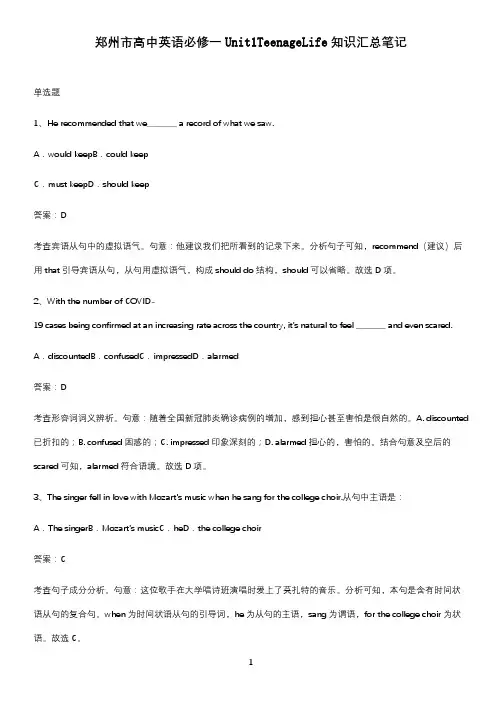
郑州市高中英语必修一Unit1TeenageLife知识汇总笔记单选题1、He recommended that we________ a record of what we saw.A.would keepB.could keepC.must keepD.should keep答案:D考查宾语从句中的虚拟语气。
句意:他建议我们把所看到的记录下来。
分析句子可知,recommend(建议)后用that引导宾语从句,从句用虚拟语气,构成should do结构,should可以省略。
故选D项。
2、With the number of COVID-19 cases being confirmed at an increasing rate across the country, it’s natural to feel ________ and even scared. A.discountedB.confusedC.impressedD.alarmed答案:D考查形容词词义辨析。
句意:随着全国新冠肺炎确诊病例的增加,感到担心甚至害怕是很自然的。
A. discounted 已折扣的;B. confused困惑的;C. impressed印象深刻的;D. alarmed担心的,害怕的。
结合句意及空后的scared可知,alarmed符合语境。
故选D项。
3、The singer fell in love with Mozart’s music when he sang for the college choir.从句中主语是:A.The singerB.Mozart’s musicC.heD.the college choir答案:C考查句子成分分析。
句意:这位歌手在大学唱诗班演唱时爱上了莫扎特的音乐。
分析可知,本句是含有时间状语从句的复合句。
when为时间状语从句的引导词,he为从句的主语,sang为谓语,for the college choir为状语。
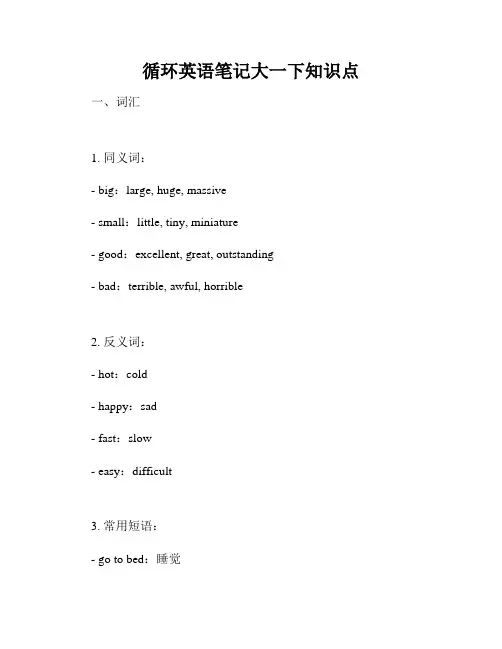
循环英语笔记大一下知识点一、词汇1. 同义词:- big:large, huge, massive- small:little, tiny, miniature- good:excellent, great, outstanding- bad:terrible, awful, horrible2. 反义词:- hot:cold- happy:sad- fast:slow- easy:difficult3. 常用短语:- go to bed:睡觉- have breakfast/lunch/dinner:吃早餐/午餐/晚餐- do homework:做作业- take a shower:洗澡- on the weekend:在周末二、语法1. 时态:- 一般现在时:I eat breakfast every day.- 过去式:She danced at the party last night.- 现在进行时:They are playing football in the park. - 将来时:We will travel to Europe next month.2. 名词:- 可数名词:a cat, two books- 不可数名词:water, milk3. 形容词:- 用法:I am tall. He has a blue car.- 比较级和最高级:This book is more interesting than that one. - 形容词作定语和表语:The happy girl is singing.三、阅读1. 短文理解:根据给定短文回答问题。
- 选项判断:根据给定选项判断句子正误。
- 完形填空:选择适当的词填入空格中,使句子通顺合理。
2. 阅读技巧:- 扫读:快速浏览短文,获取整体信息。
- 精读:仔细阅读,理解文章细节和意义。
- 划重点:将文章中重要的信息标记出来。
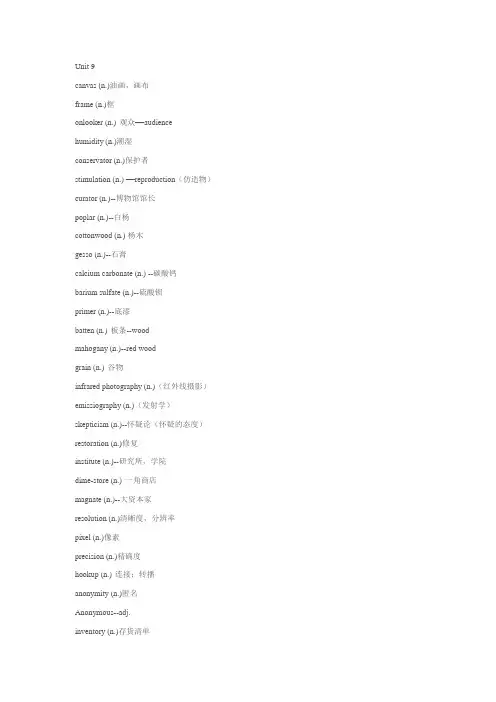
Unit 9canvas (n.)油画,画布frame (n.)框onlooker (n.) 观众==audiencehumidity (n.)潮湿conservator (n.)保护者stimulation (n.) ==reproduction(仿造物)curator (n.)--博物馆馆长poplar (n.)--白杨cottonwood (n.) 杨木gesso (n.)--石膏calcium carbonate (n.) --碳酸钙barium sulfate (n.)--硫酸钡primer (n.)--底漆batten (n.) 板条--woodmahogany (n.)--red woodgrain (n.) 谷物infrared photography (n.)(红外线摄影)emissiography (n.)(发射学)skepticism (n.)--怀疑论(怀疑的态度)restoration (n.)修复institute (n.)--研究所,学院dime-store (n.) 一角商店magnate (n.)--大资本家resolution (n.)清晰度,分辨率pixel (n.)像素precision (n.)精确度hookup (n.) 连接;转播anonymity (n.)匿名Anonymous--adj.inventory (n.)存货清单capsule (n.)胶囊;航天舱shuttle fleet (n.)航天飞机车队(shuttle-往来于两地之间的航班等)staple (n.)主食fix (n.)一剂(量)real estate (n.)不动产,土地upkeep (n.)保养,维修condo (n.)各户有独立产权的公寓(大楼)lock-in (n.)占据spotlight (n.)聚光灯(turns ~ on)balance beam (n.)平衡木rematch (n.)(尤指因首轮未决出胜负)重赛,复赛pavilion (n.)临时建筑物;大型文体馆;看台marathon (n.)马拉松赛跑referee (n.)裁判员stopwatch (n.)(赛跑等记时用的)秒表,跑表host (n.)主人;东道主scorecard (n.) 记分卡myth (n.)神话expenditure (n.)花费;消耗dune (n.)由风吹积成的)沙丘cube (n.)立方体rod (n.)杆porcupine (n.)豪猪quill (n.)刺filament (n.)长丝,单纤维dandelion (n.)蒲公英installation (n.)安装;装置cobblestone (n.)鹅卵石Ferris wheel (n.)大观览车;摩天轮alternating current (n.)交流电;prototype (n.)原型porcelain (n.)瓷,瓷器tile (n.)瓦片,瓷砖chinaware (n.)陶瓷器fruition (n.)完成,实现;取得成果aesthetic (n.)美的;艺术的;审美的vanguard (n.)先锋,前锋;先驱,领导者showcase (v.)展示(优点)dispel (v.)消除(疑虑等)cobble (v.)粗劣地制作pierce (v.)刺穿,戳穿;刺破sway (v.)摇摆encounter (v.)遭遇;偶遇track (v.)跟踪;追踪…的动向resume (v.)重新开始,继续;重新回到,恢复obligate (v.)使(在法律或道义上)负有责任或义务;对…施以恩惠acclaim (v.)称赞,表扬amount to (v.)共计;意味着capture (v.)引起(注意、想象、兴趣)generate (v.)形成,造成sprout up (v.)涌现globalise (v.)全球化represent (v.)代表;象征clad (v.)用金属包被的allude to (v.)暗示fabricate (v.)编造;制造,组装Fabricated == fictionalassemble (v.)聚集,收集;组装orient (v.)标定方向metropolitan area (n.)大城市区域;城区reverse (v.)倒退(adj)反面的;颠倒的Unit 10River Thames泰晤士河gallery (n.)画廊stretch (n.)拉伸landmark (n.)地标Westminster Abbey威斯敏斯特大教堂the Tower 塔楼boundary (n.) 边界procession (n.) 游行队伍borough (n.)Town or district within a larger town(自治市镇)meridian (n.)子午线radius (n.)半径距离reconstruction (n.)重建reign (n.)统治sculpture (n.)雕塑widow (n.)寡妇armour (n.)装甲pottery (n.)陶器miniature (n.)微型registry office (n.) 登记处best man (n.)伴郎identification (n.)标识transit (n.)过境privilege (n.)特权bureaucrat (n.)官僚--bureau--局/办公室bikini比基尼rig (n.)钻车kilt (n.)苏格兰短裙bagpipe (n.)风笛tartan (n.)格子呢badge (n.)徽章tattoo (n.)纹身intersect (v.)交叉,相交,交流adhere to (v.) (+ doing ath--坚持做)buckle (v.)--褶皱flake (v.) 剥落(~ + off)warp (v.) 弯曲assess (v.) 评估withstand (v.) (stand,bear)snap back (v.)(迅速恢复)contract (v.)【opp:expand】crack (v.) --break(破裂)brace (v.)(be braced with)支撑,加固condense (v.)--凝结drip (v.) --滴下swell (v.) 膨胀,肿胀split (v.) 分离,分开season (v.)(使)木材风干,晒干fluctuate (v.)--波动intrigue (v.)(激起某人的好奇心)verify (v.)核实;证明resolve (v.) 辨析,分辨crop (v.)有收成;收割;discard (v.)丢弃,抛弃dock (v.)(使)在太空对接ration (n.) 定量(v.)限量供应(restrict) orbit (v.)在…轨道上运行applaud (v.)鼓掌inherit (v.)继承(v.)execute (v.)执行(v.)sunbathe (v.)日光浴sparkle (v.)闪光enroll (v.)注册elastic (a.)--flexiblecrisscrossed (a.)交叉的undeterred (a.)【un+ deter(害怕)】--未受阻的vulnerable (a.)--脆弱的,易受伤的resilient (a.) 复原力superimposed (a.)叠加variable (a.)变化的pliant (a.)能适应的humid (a. )潮湿的fanatic (a.)狂热分子premium (a.)高价的,(n--保险费)mandatory (a.)==compulsory (a.)==obligatory (a.) quarterly (a.)季度的low-end (a.)低档的conspicuous (a.)显眼的,引人注目的undetectable (a.)无法觉察的corrective (a.)改正的belated (a.)来得很迟的vital (a.)必要的,至关重要的bulk (a.)大宗的compressed (a.) 压缩的Vs oppressoff-the-shelf (a.)现成的,买来不用改就用的corporate (a.)公司的;法人的(n.组织)imposing (a.)印象深刻的lavish (a.)过分慷慨的representational (a.)具象派的curved (a.)弧形的,曲线的playful (a.)闹着玩的;爱玩的transparent (a.)透明的;易懂的;易识破的innovative (a.)革新的;创新的fiber-optic (a.)光导纤维的botanic (a.)植物的,植物学的striking (a.)显著的;引人注目的visual (a.)视觉的ultimate (a.)最后的pronounced (a.) (obvious)cubelike立方的solemn (a.) 庄严的prehistoric (a.)史前generous (a.)慷慨。
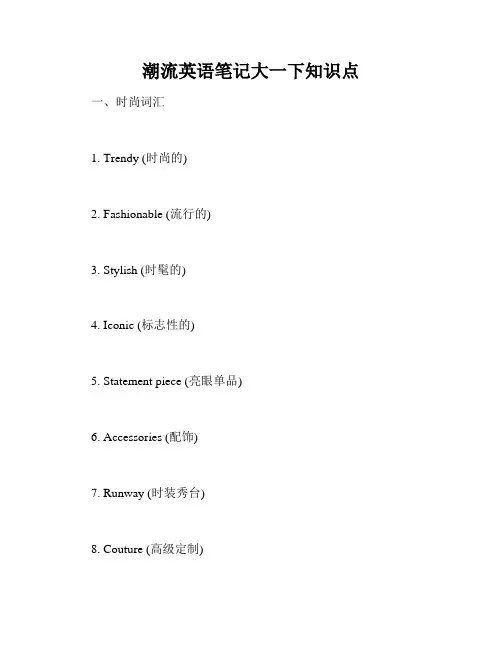
潮流英语笔记大一下知识点一、时尚词汇1. Trendy (时尚的)2. Fashionable (流行的)3. Stylish (时髦的)4. Iconic (标志性的)5. Statement piece (亮眼单品)6. Accessories (配饰)7. Runway (时装秀台)8. Couture (高级定制)二、流行趋势1. Streetwear (街头潮流)街头潮流在当今社会中越来越受欢迎。
它通常具有年轻人喜爱的休闲、舒适和个性化的风格。
街头潮流不仅仅是服装,还包括了鞋子、帽子、背包等各种配饰。
2. Athleisure (运动休闲)运动休闲是指结合了舒适的运动服饰和时尚元素的潮流趋势。
这种风格注重运动与休闲的平衡,使人们在日常生活中既能感到舒适自在,又能展示出时尚的一面。
3. Vintage (复古)复古风格指的是回归过去的时尚趋势。
人们喜欢将旧时代的服装重新演绎并搭配在现代的造型中,这样的着装会带来独特的复古气息。
4. Minimalism (简约主义)简约主义是一种注重简洁和极简风格的潮流趋势。
它强调简单、纯粹和精致的设计理念,通过减少不必要的装饰和图案来营造出时尚的效果。
三、潮流品牌1. Supreme (街头潮牌)Supreme 是一家以街头潮流为主题的品牌,其标志性的红白字体在全球范围内广为人知。
Supreme 推出的单品通常引发疯狂的购买风潮,成为追求时尚的年轻人的梦寐以求的物品。
2. Gucci (奢侈品牌)Gucci 是一家意大利奢侈品牌,以其高品质和独特设计而闻名。
Gucci 的产品系列涵盖了服装、鞋子、包包等多个领域,成为时尚界的代名词。
3. Off-White (时尚新秀)Off-White 是一家由设计师 Virgil Abloh 创立的品牌,以其独特的设计语言和潮流元素而备受瞩目。
Off-White 的单品经常在社交媒体上引起热议,并受到时尚潮人的喜爱。
英语笔记大一重点单词表1. abandon - to leave behind or give up on2. ability - the power or skill to do something3. able - having the power or skill to do something4. abnormal - not normal or usual5. aboard - on or onto a ship, airplane, bus, etc.6. abolish - to officially end or stop something7. abortion - the deliberate termination of a pregnancy8. about - on the subject of; concerning9. above - in or to a higher place10. abroad - in or to a foreign country or countries11. absence - the state of being away or not present12. absolute - not limited by conditions, exceptions, or restrictions13. absorb - to take in or soak up14. abuse - to use wrongly or improperly15. academic - related to education, especially at a college or university16. accelerate - to go faster or to cause something to go faster17. accept - to agree to or approve of something18. access - the right to enter or use something19. accident - an event that is not planned or intended20. accompany - to go somewhere with someone as a companion21. accomplish - to succeed in doing something22. according - as stated or indicated by someone23. account - a record of money that has been paid and received24. accurate - free from mistakes or errors25. accuse - to say that someone has done something wrong26. achieve - to succeed in reaching a particular goal27. acid - a chemical substance that is usually sour and can burn holes in things28. acknowledge - to admit or accept the truth or existence of something29. acquire - to get or gain something30. across - from one side to the other31. act - to do something32. action - the process of doing something33. active - engaged in action34. actor - a person who acts in a play, movie, etc.35. actress - a woman who acts in a play, movie, etc.36. actual - existing in fact or reality37. adapt - to change something so that it functions better or is bettersuited for a particular purpose38. add - to put (something) with another thing or group of things39. addict - a person who cannot stop doing or using something harmful40. addition - the act or process of adding something to something else41. address - the words and numbers that are used to describe the location ofa building and that are written on letters, envelopes, and packages so that they can be mailed correctly42. adequate - enough for some requirement or purpose43. adjust - to change or move (something) slightly in order to make it better, more accurate, or more effective44. administration - the activities that relate to running a business, school, etc.45. admire - to feel respect or approval for (someone or something)46. admit - to say usually in an unwilling way that you accept or do not deny the truth or existence of (something)47. adopt - to take a child of other parents legally as your own child48. adult - fully grown and developed49. advance - to move forward50. advantage - a good or desirable quality or feature51. adventure - an exciting or dangerous experience52. advertise - to make the public aware of (something) through a medium of communication in order to promote or sell it53. advice - suggestions about what someone should do54. affect - to produce an effect upon (someone or something)55. afford - to be able to do or pay for (something)56. afraid - feeling fear57. Africa - a continent south of Europe and between the Atlantic and Indian oceans58. after - following in time or place; later than59. afternoon - the part of the day between noon and evening60. again - once more; another time61. against - in opposition to62. age - the amount of time during which a person or animal has lived63. agency - a business that provides a particular service64. aggressive - tending toward or exhibiting aggression65. ago - in the past66. agree - to have the same opinion about something67. agriculture - the science or occupation of farming68. ahead - in or toward the front69. AIDS - a disease of the human immune system that is caused by infection with HIV70. aim - to direct (a weapon) at a target71. air - the invisible gaseous substance surrounding the earth72. aircraft - a vehicle used for flying that has wings and one or more engines73. airline - a company that owns and operates airlines74. airport - a place where aircraft regularly take off and land75. album - a book with blank pages where you can put a collection of photographs, stamps, etc.76. alcohol - a strong, colorless liquid that has a sharp flavor and that is used in some medicines and other products77. alive - having life; living78. all - every thing or person79. allow - to permit; to let80. almost - only a little less than; nearly81. alone - without anyone or anything else82. along - in a line matching the length or direction83. already - before or by this or that time84. also - in addition to what has been said85. alter - to change or become different86. although - in spite of the fact that87. always - at all times88. amazing - causing great surprise or wonder; astonishing89. ambition - a strong desire to do or achieve something90. ambulance - a vehicle used for taking injured or sick people to the hospital91. among - in or through (a group or mass of things)92. amount - the total number or quantity of something93. amuse - to entertain or cause laughter94. analyze - to study or examine something in detail95. ancient - very old; having lived or existed for a very long time96. anger - a strong feeling of displeasure or annoyance97. angle - the space between two lines or surfaces that meet at one point98. angry - having a strong feeling of displeasure or annoyance99. animal - a living thing that is not a human being or plant100. anniversary - a date that is remembered or celebrated because a special event happened on that date in a previous year101. announce - to make (something) known in a public or formal way102. annoy - to cause mild anger or irritation103. annual - happening once every year104. another - one more in addition to the first or more of the same kind105. answer - something that is said or written as a reply to a question106. anticipate - to expect or look ahead to (something) with pleasure107. anxiety - fear, dread, or uneasiness about what may happen108. anxious - afraid or nervous especially about what may happen : feeling anxiety109. any - one or some of whatever kind110. apart - separated by an amount of space or time111. apologize - to express regret for doing or saying something wrong112. apparent - clear or manifest to the understanding; evident; obvious113. appeal - to make an earnest request; to ask for something114. appear - to come into sight or view; to show oneself115. apple - a round, juicy fruit with firm, white flesh and red, yellow, or green skin116. applicant - a person who formally requests something, especially a job or admission to an educational institution117. application - the act or process of making a formal request for something, such as a job or admission to an educational institution118. apply - to ask formally for (something)119. appointment - a time you have arranged to meet someone or go somewhere 120. appreciate - to understand the worth or importance of (something or someone) : to admire and value (something or someone)121. approach - to move or become near or nearer to something or someone122. appropriate - suitable or proper for a particular person, place, or situation123. approval - the belief that something or someone is good or acceptable 124. approve - to believe that something or someone is good or acceptable125. approximate - not exact but close in value or amount126. arbitrary - not planned or chosen for a particular reason; not based on reason or evidence127. architect - a person who designs buildings128. area - a part of a surface or a space that is not flat or level129. argue - to give reasons for or against something : to say or write things in order to change someone's opinion about what is true, what should be done, etc.130. argument - a statement or series of statements for or against something131. arise - to come into existence or begin to occur or to happen as a result of some action, process, or set of circumstances132. arm - either of the two long body parts that join the shoulder to the hand133. armed - having a weapon (such as a gun or a knife)134. army - a large organized group of soldiers who are trained to fight on land135. around - in a circle or in a curved line136. arrange - to put things in a particular order or position137. arrest - to use the power of the law to take and keep (someone, such as a criminal)138. arrival - the act of coming to or reaching a place139. arrive - to come to or reach a place after traveling, being sent140. art - the conscious use of skill and creative imagination141. article - a piece of writing about a particular subject that is included in a magazine, newspaper, etc.142. artificial - not natural or real : made, produced, or done to seem like something natural143. artist - a person who creates art : a person who is skilled at drawing, painting144. as - used in the function of a preposition, conjunction, or adverb145. ashamed - feeling shame, guilt, or disgrace146. Asia - the largest continent with the most people147. aside - to or toward the side148. ask - to say or write something in order to get an answer149. asleep - sleeping or not awake150. aspect - the way a person, place, or thing appears to you : a way of looking at something151. assess - to make a judgment about (something)152. assign - to give someone a particular job or duty153. assist - to give support or help154. associate - to think of one person or thing when you think of another person or thing : to have a connection or relationship with someone orsomething155. assume - to think that something is true or probably true without knowing that it is true156. assurance - the state of being sure or certain about something157. assure - to make (someone) sure, certain, or confident158. at - used to indicate location or position159. atmosphere - the mixture of gases that surrounds the Earth160. attach - to fasten or join one thing to another161. attack - to act violently against (someone or something) : to try to hurt, injure, or destroy (something or someone)162. attempt - to try to do (something)163. attend - to go to and be present at (an event, meeting, etc.)164. attention - the act or power of carefully thinking about, listening to,or watching someone or something165. attitude - a feeling or way of thinking that affects a person's behavior 166. attract - to cause (someone or something) to go to or move to or toward a place167. audience - a group of people who gather together to listen to something 168. author - a person who has written something; especially : a person whohas written a book or who writes many books169. auto - a car170. automatic - having controls that allow something to work or happenwithout being directly controlled by a person171. automobile - a car172. autumn - the season between summer and winter173. available - easy or possible to get or use174. average - a number that is calculated by adding quantities together and then dividing the total by the number of quantities175. avoid - to stay away from (someone or something)176. awake - to stop sleeping; to wake up177. award - to grant as merited or due178. aware - knowing that something exists, or having knowledge or experience of a particular thing179. away - from this or that place; at a distance180. awful - very bad or unpleasant181. awkward - lacking social grace and assurance; difficult to use or handle 182. axe - a tool with a heavy, sharp blade183. baby - a very young child184. back - the rear side of the human body from the shoulders to the hips 185. background - the things that can be seen behind the main things or people in a picture186. backward - toward the back or rear : not moving or flowing forward187. bacon - a meat that comes from a pig and that is usually eaten in thin strips188. bad - not good; of poor quality or low standard189. bag - a container made of thin material (such as paper, plastic, or cloth) that opens at the top and is used for holding or carrying things190. bake - to cook (food, such as bread and cake) with dry heat in an oven191. balance - a state in which different things occur in equal or proper amounts or have an equal or proper amount of importance192. ball - a usually round object that is used in a game or sport193. ban - to forbid people from using (something) : to say that something cannot be used or done194. band - a strip of material worn around the arm, wrist, etc.195. bank - an establishment for the custody, loan, exchange。
大一英语上学期知识点笔记一、单词拼写1. accommodation - 住宿2. pronunciation - 发音3. equivalent - 等值的4. conscience - 良心5. hemisphere - 半球6. adolescence - 青春期7. meteorology - 气象学8. suburban - 郊区的9. arithmetic - 算术10. psychology - 心理学二、语法1. 一般现在时:表示经常发生的动作或者客观事实。
例句:She often goes to the gym in the morning.2. 现在进行时:表示当前正在进行的动作。
例句:I am studying for my exams this week.3. 一般过去时:表示在过去某个时间发生的动作或者状态。
例句:He lived in Paris for two years.4. 过去进行时:表示在过去某个时间正在进行的动作。
例句:They were playing basketball when it started to rain.5. 将来时:表示将来某个时间会发生的动作。
例句:We will have a meeting tomorrow afternoon.三、词汇1. 同义词:具有相同或者非常相似意义的词语。
例句:big - large, small - little2. 反义词:意义相反的词语。
例句:hot - cold, happy - sad3. 前缀和后缀:可以加在词语前面或者后面,改变词的意义。
例句:un- (不), -able (能够)四、阅读理解1. 主旨大意题:根据文章内容判断文章的主要观点或者总结。
2. 细节题:根据文章中具体的信息找出正确的答案。
3. 推理题:根据文章中的暗示或者线索进行推测。
五、写作技巧1. 描述性写作:用适当的形容词和副词来描述人、事、物。
福师《大学英语(2)》第一课 Nature 课堂笔记Air Pollution空气污染Air supplies us with oxygen which is essential for our bodies to live.①Air is 99.9% nitrogen, oxygen, water vapor and inert gases.②Human activities can release substances into the air, some of which can cause problems for humans, plants, and animals.③空气为我们提供生存所必不可少的氧气。
空气中99.9 % 由氮气﹑氧气﹑水蒸气和惰性气体组成。
人类活动释放出的物质进入空气,其中的一些会对人类﹑植物和动物造成影响。
There are several main types of pollution and well-known effects of pollution which are commonly discussed. These include smog, acid rain, the greenhouse effect, and "holes" in the ozone layer.④Each of these problems has serious effects on our health and well-being as well as on the whole environment.污染有几大类型,所造成的影响广为人知,也经常引发讨论, 包括烟尘﹑酸雨﹑温室效应和臭氧层“空洞”。
这些问题已严重影响到我们的健康和幸福,也影响到整个环境。
One type of air pollution is the release of particles into the air from burning fuel for energy. Diesel smoke is a good example of this particular matter. This type of pollution is sometimes referred to as "black carbon" pollution.⑤The exhaust from burning fuels in automobiles, homes, and industries is a major source of pollution in the air.⑥Some authorities believe that even the burning of wood and charcoal in fireplaces and barbeques can release significant quantities of soot into the air.一类空气污染是在燃烧燃料获取能源时将粒子排放到空气中。
大一英语笔记整理以下是一个大一英语笔记整理的示例,涵盖了词汇、语法和阅读理解等几个方面:词汇:1. 重要的新词汇:* Access:进入,接触* Cycle:循环* Dynamic:动态的* Impact:影响* Sustainable:可持续的2. 词汇练习:* 完成句子:使用新学的词汇来完成以下句子,例如,“这个项目将产生巨大的影响。
”(这个项目将产生巨大的impact。
)* 单词匹配:将词汇表中的单词与相应的定义匹配起来。
语法:1. 现在完成时态:* 结构:have/has + 过去分词* 用法:表示过去的动作或状态对现在的影响或结果。
* 示例:I have finished my homework.(我已经完成了我的作业。
)2. 目的状语从句:* 结构:so that + 从句* 用法:表示目的。
* 示例:I got up early so that I could catch the train.(我早起是为了赶上火车。
)3. 完成时态与目的状语从句的练习:* 改写句子:使用正确的时态和从句结构来改写以下句子,例如,“我学习英语为了能够出国留学。
”(I have learned English so that I can study abroad.)阅读理解:1. 文章大意:本文讲述了互联网的发展和影响,提到了人们获取信息的方式以及社交方式的改变。
2. 重要细节:作者提到了互联网的优点和缺点,包括信息获取的便利性、社交方式的多样性以及网络安全问题等。
3. 阅读理解练习:* 选择题:根据文章内容,选择正确的答案。
例如,“互联网的优点不包括什么?”(A)信息获取便利。
(B)社交方式多样。
(C)安全性差。
(D)方便购物。
正确答案为(C)安全性差。
* 简答题:根据文章内容,回答问题。
例如,“互联网的发展对人们的生活产生了哪些影响?”(互联网的发展让人们获取信息更加便利,社交方式更加多样,但也带来了网络安全问题。
樱桃英语笔记大一下知识点一、语法知识点1. 时态:包括一般现在时、一般过去时、一般将来时等各种时态的使用规则和动词变化形式。
2. 名词:名词的单复数形式、所有格、特殊名词的变化规则等。
3. 代词:包括人称代词、物主代词、反身代词等的使用方法和变化形式。
4. 形容词和副词:形容词和副词的比较级和最高级形式,修饰名词和动词的用法。
5. 介词:介词的常见用法、搭配和固定搭配等。
6. 从句:包括定语从句、名词性从句和状语从句的使用方法、连接词的选择等。
二、词汇知识点1. 常用词汇:学习一些常用的中英文词汇,包括名词、动词、形容词等。
2. 专业词汇:针对学习专业英语的同学,掌握与所学专业相关的词汇。
3. 熟词生义:学习一些词汇的词义扩展和用法,丰富词汇的应用范围。
4. 同义词和反义词:了解一些意思相近或相反的词汇,丰富表达的方式。
三、听力技巧1. 内容理解:通过多听多练,提高对英语语音和语调的理解能力。
2. 笔记记录:在听力过程中及时做好笔记,捕捉关键信息和重要细节。
3. 听力策略:学习一些听力技巧和策略,如通过上下文推测、寻找关键词等。
四、阅读技巧1. 预测推测:在阅读之前,通过标题、图表等预测文章的内容,提前了解主题。
2. 快速扫读:掌握快速扫读的技巧,了解文章的结构和大意。
3. 查词猜词:遇到生词时,通过上下文推测词义,提高阅读理解能力。
4. 主题句定位:通过找出每段的主题句,帮助理解整篇文章的主旨和关键信息。
五、写作技巧1. 句子结构:学习一些复合句和复杂句的写作技巧,提高句子的多样性和流畅度。
2. 写作逻辑:掌握文章的逻辑结构和段落的搭建方式,使文意清晰、层次分明。
3. 引用引证:学会引用他人观点和事实的方法,提升文章的可信度和可读性。
4. 遣词造句:通过积累优美的表达方式和修辞手法,使写作更加生动有趣。
六、口语表达1. 口语技巧:学习一些口语表达的技巧,如交际用语、缩短句子等。
2. 模仿学习:通过模仿和跟读,提高口语的发音准确性和语调自然度。
UNIT 1 Areward vt. 报答,酬谢,奖励n. 1.报答,奖赏 2.报酬,酬金frustrate vt. 1.使沮丧,使灰心2.使挫败,使受挫折junior n. 1.年少者2.地位较低者,晚辈positive a. 1.积极的,肯定的2.确实的,明确的senior n. 较年长者former a. 在前的,以前的,旧时的n. 前者unlike prep. 不像;和... ...不同▲intimidate vt. 恐吓,威胁opportunity n. 机会,时机online a. & ad. 连线的, 联网的; 连线地, 联网地communication n. 交流,交际;通信medium n. 媒质,媒介物,传导体 a. 中等的,适中的phone n. 电话,电话机modem n. 调制解调器access n. 1.接近,进入2.通道,入口technology n. 工艺,技术participate vi. 参与,参加virtual a. 1.虚构的,虚拟的2.实质上的,事实上的,实际上的commitment n. 1.信奉,献身2.承诺,许诺,保证discipline n. 1.纪律; 控制2.惩罚,处分3.学科minimum a. 最低的,最小的n. 最低限度,最少量assignment n. 1.(分派的)任务,(指定的)作业2.分配,指派notebook n. 笔记簿embarrass vt. 使窘迫,使尴尬,使不好意思screen n. 1. 屏幕,银幕2. 屏风,帘,纱窗continual a. 1.不间断的,不停的2.多次重复的,频频的continually ad. 1. 不间断地,不停地 2. 多次重复地,频频地finally ad. 最后,终于▲reap vt. 1.获得,得到2.收割,收获benefit n. 益处,好处vt. 有益于insight n. 洞察力,洞悉,深刻的见解culture n. 文化,文明communicate vi. 交流,交际vt. 传达,传播favorite (英favourite) a. 特别受宠的n. 特别喜爱的人(或物)activity n. 活动,行动gap n. 缺口,裂口Phrases and Expressionsbe well worth + sth./ doing sth. 值得... ...的not only ...but also ... 不仅... ...而且... ...far from 一点都不a couple of 两三个get access to 可以使用;获得keep up with 跟上,不落后feel like sth./doing sth. 想做,想要give up 停止,放弃reap the benefits of 获得益处,得到好处come across 偶然遇上trade for 用... ... 换participate in 参加now that 既然, 由于reach out to 接触, 联系UNIT 1 Bcommunity n. 社区,社会, 团体,界expand v. 1.(使)扩大,(使)扩张,(使)扩展 2.膨胀aware a. 意识到的,知道的unique a. 1.惟一的,独特的,独一无二的2.极不寻常的,极好的following a. 接着的,下述的n. 一批追随者ideal a. 1.完满的;理想的2.想像的,空想的visual a. 视觉的,看得见的barrier n. 1.栅栏,关卡,检票口 2.障碍,隔阂 3.屏障addition n. 1.加,加法2.增加的人(或物)reflect v. 1.深思,考虑,反省 2.反映, 体现 3.反射,显示environment n. 环境,周围状况,自然环境critical a. 1.决定性的,关键性的,危急的 2.批评的,批判的ability n. 能力,本领, 才能,才智perspective n. 视角,观点,想法peer n. 同龄人,同等地位的人instruct vt. 1.指示,命令;通知2.教育,指导instructor n. 教师;指导者arise vi. 1.产生;出现;发生 2.(由... ...)引起,(由... ...)产生,起源于3.起身,起床absolute a. 十足的,地道的新视野英语第一册单词表absolutely ad. 十足地,地道understanding n. 1.理解力2.谅解reinforce vt. 增强,加强,加固requirement n. 要求,必要条件; 需要,需要的东西likely a. 可能的,有希望的ad. 可能地commit vt. 1.使用; 用于2.犯(错误、罪行等),干(蠢事、坏事等) 3.使承担义务,使承诺input n. 输入,投入essential a. 必不可少的,绝对必要的,非常重要的n. 要素,要点challenge vt. 1.对... ... 质疑,对... ... 怀疑 2.向... ... 挑战normally ad. 通常,正常地sequence n. 1. 连续,一连串 2. 次序,顺序sequential a. 连续的vital a. 1.极其重要的2.有生命的,充满生机的effective a. 1.有效的,生效的,起作用的2.效果好的, 给人印象深刻的Phrases and Expressionsplay a role in ... 起... ...作用be aware of 对... ...清楚in addition 另外,加之reflect on 深思,考虑,反省allow for 考虑到,顾及,为... ...留出余地UNIT 2 Aweekday n. 工作日(星期六、日以外的日子)click vi. 发出"嘟"、"咔嗒"等轻微响声n. 咔嗒声blast v. 1.发出猛烈响声2.爆破3.以炸药攻击forth ad. 出来; 向前horrible a. 可怕的;令人不悦的stuff n. 东西;材料rhythm n. 节奏; 韵律▲weird a. 古怪的;离奇的definitely ad. 当然;无疑地powerful a. 1.有力的,强壮的 2.功效大的youngster n. 青少年; 青年musician n. 音乐师offensive a. 1.极讨厌的,令人作呕的2.攻击性的disturb vt. 1.打扰, 妨碍2.使不安,使烦恼grab vt. 抓取,攫取thorough a. 1.彻底的2.认真的thoroughly ad. 仔细地;彻底地bang v. (使)撞击;(使)猛击, 使劲敲hustle vt. 催促;赶towel n. 毛巾■T-shirt n. 圆领衫jeans n. 牛仔裤wrap vt. 包,裹sweater n. (羊)毛衣■makeup n. 化妆品toast n. 烤面包instrument n. 1.乐器2.工具■yah interj. 表示讨厌、嘲笑、无耐心等发出的惊叹语disgust vt. 使厌恶,使反感disgusting a. 令人厌恶的,令人作呕的blouse n. 女衬衫▲closet n. 壁柜▲bug vt. 令人生气;使人烦;纠缠■eye-liner n. 眼线(笔)annoy n. 使生气; 使恼怒■tattoo n. 纹身pierce v. 穿洞; 刺穿,刺破bolt vi. 冲出去,逃跑vt. 闩,拴住Phrases and Expressionsblast forth (声音)突然响起来along with 一道turn off 关burst into 匆匆进入突然爆发over and over 一次次reach for 伸手去抓turn up 增大(声音、火焰等)turn down 减小(声音、火焰等)as well as 和,以及,还有as usual 与往常一样turn on 开,打开that much 那么......bolt out 匆匆离开UNIT 2 B▲sip v. 啜,呷,小口地喝,抿honey n. 1.亲爱的,宝贝2.蜂蜜upset a. 不安的,担心的;不舒服的vt. 使心烦意乱,使苦恼,使不适; 使(人)不安knot n. 1.肿块, 节疤2.结awful a. 糟糕的,极坏的fashion n. 时尚old-fashioned a. 不时髦的;陈旧的,过时的tune n. 调子;曲调;旋律tuneless a. 无旋律的;不动听的◆lyric n. 歌词; 抒情诗repeatedly ad. 反复地,一次又一次appeal vi. 1.吸引, 有吸引力, 有感染力2.呼吁,恳求rid vt. 从...中清除, 使摆脱,解除...的负担▲distract vt. 分散注意力, 转移注意力,使分心section n. 部分lucky a. 幸运的, 侥幸的,吉利的teenager n. 青少年brow n. 1. 眉,眉毛2. 额◆eyebrow n. 眼眉identity n. 身份;本体▲defy vt. (公然)违抗,藐视; 挑,激▲expel vt. 把......除名,把......开除; 驱逐,赶走,放逐permanent a. 永久(性)的,固定的radical a. 彻底不同的,完全不同的, 根本不同的n. 激进分子; 激进派painful a. 悲伤的;痛苦的identify vt. 1.认出,鉴定出2.使与……相连negative a. 1.不好的;负面的 2.否定的influence n. 影响, 影响力vt. (产生)影响concern n. 1.关心;担心2.关切的事,有关的事vt. 使不安;使担心anyway ad. 不论怎么,不管怎么说▲moan vi. 1.呻吟2.抱怨,发牢骚appointment n. 约会▲briefcase n. 公文包mature v. (使)成熟;(使)长成 a. 长大了的;成熟的rebel vi. 反抗;反对, 反叛patience n. 耐心, 忍耐anchor n. 1.锚 2.可依靠的人或物Phrases and Expressionsin peace and quiet 平静地make one's blood boil 使(某人)生气get rid of 清除驱赶;消除the knots in one's stomach 不安go too far 走极端drop out of 退出talk over 商量UNIT 3 Alean vi. 1.倚;靠2.倾斜;倾向;偏向balance n. 1.平衡;均衡2.均势, 平衡v. 1.(使) 平衡, (使) 均衡2.权衡;比较severe a. 1.非常恶劣的;紧张的;困难的 2.严格的;严肃的;严厉的severely ad. 严格地;严厉地;非常恶劣地▲cripple vt. 1.使跛;使残废2.严重地损坏;削弱n. 伤残人(或动物)inward a. 1.在内的;内部的(尤指在头脑中、精神上) 2.向内的inwardly ad. 内心或精神方面coordinate vt. 使协调halt v. 暂停;中断;中止n. 暂停;中断;中止impatient a. 1.不能冷静地对待或等待的;易烦躁的;不耐心的 2.急切的;渴望的pace n. 1.(尤指走或跑的)速度 2.进步或发展的速度(尤指某项活动的速度)vi. 踱步, 慢步走adjust v. 1.使适应(新环境);适应2.调整;校准;调准subway n. 1.(城市中的)地下铁道2.(尤指马路或铁路下方的)地下通道;人行隧道despite prep. 尽管; 不管▲nasty a. 1.令人不快的;令人厌恶的2.不友善的;恶意的wagon n. 1.儿童手推车2.四轮运货马(牛)车 3.铁路货车(或客车) 车厢▲cling vi. 1.抱住;抓紧2.坚持;坚守;拒不放弃;抱定rail n. 1. [C]横挡;栏杆;护栏2. [C](火车或电车的)铁轨hand-rail n. [C] (楼梯等的)扶手tunnel n. 地下通道;(为公路或铁路穿过山岭河流或海底的)隧道▲basement n. 地下室amaze vt. 使大为惊讶;使惊愕stress n. 1.(由于精神、体力不适或困境等造成的)压力;忧虑;紧张2.强调;重视vt. 1.强调, 重视2.重读, 读重音complaint n. 1. 抱怨;诉苦 2.控告;投诉;抱怨envy n. 妒忌;羡慕vt. 羡慕;妒忌envious a. 嫉妒的;羡慕的owner n. 物主;所有人precise a. 1.精确的;准确的;明白的;无误的 2.正好;就在precisely ad. 准确地;精确地;正好;恰恰engage v. 1.(使)从事;(使)忙于 2.雇用;聘用3.使全神贯注;引起(注意);占用(时间)local a. 地方的;当地的;本地的n. 当地人,本地人baseball n. 棒球运动;棒球occasion n. 1.(事件发生的)特定时刻;时机 2.(适当的)时机;机会punch v. 1.用拳猛击2.用打孔机打孔▲shove vi. 推;挤;撞aid n. 帮助;援助;救护vt. 帮助, 援助unaided a. 无助的;独力的kid v. 1.开玩笑2.欺骗;哄骗n. 小孩或年轻人urge vt. 1.力劝2. 鼓励;催促;鞭策n. 强烈愿望, 迫切需求dive n. 1.(美俚)(拳击中)假装被击倒 2.跳水vi. 跳水, 潜水navy n. 1.(一国的)海军2.一个国家的军舰及其全体官兵reluctant a. 不愿意的;迟迟不合作的;不同意的reluctance n. 不愿;勉强worthy a. 1.值得尊敬的;值得考虑的2.值得......的;应......的;足以......的unworthy a. 1.不值得的;不配的2.(与......的身份、资格、性质)不适合的;不相称的complain vi. 抱怨;诉苦▲trifle n. 无价值的或不重要的东西、问题、行动、琐事、小事v. 轻视, 小看Phrases and Expressionsgrow up 成长, 长大start out 出发make it 及时赶到even if 即使, 虽然subject to 使......遭受now that 既然even though 虽说, 即使in some way 以某种方式have a good time 过得愉快break out 爆发, 突然发生on leave 休假see to 照料; 务必做到, 务须UNIT 3 Belderly a. (指人)年龄相当大的;中年以上的collapse vi. 1.(指人)病倒;累倒;昏倒2.倒塌;塌陷n. 1.倒塌, 塌陷2.昏倒; 崩溃ambulance n. 救护车county n. 1.(美国及其他国家)郡;县(州以下的行政区分)2.(英国最大行政单位)郡locate vt. 1.确定......的位置;找出......的位置2.(尤用于被动语态)位于emergency n. 紧急事件;紧急情况emergency-room n. (医院) 急诊室marine n. 海军陆战队的军官或士兵 a. 1.海里的, 海生的2.海运的, 海事的apparent a. 1.明显的;显而易见的 2.外表的;表面上的;假的apparently ad. 外表上;表面上;看上去像▲corps n. 军(由两个或两个以上的师组成)vehicle n. 陆上交通工具、车辆▲marsh n. 沼泽(地带);湿地military a. 军人的;军用的;陆军的;军事的;军队的sole a. 1.惟一的;独一无二的;仅有的2.(某人或某公司)专用的;独占的;不公用的enable vt. 1.(通过授予必要的权利和手段)使能够;使可以2.使成为可能dusk n. 黄昏;薄暮lobby n. 门廊;门厅;接待室dim a. 1.(指眼睛、视力)看不清楚的 2.微暗的;朦胧的dimly ad. 模糊地;朦胧地oxygen n. 氧;氧气extend v. 1.伸开;展开(身体或四肢)2.使(在空间或时间上)伸展;扩大;加大▲limp a. 1.无力的;没精神的2.柔软的;软弱的vi. 一瘸一拐地走squeeze v. 1.压;挤;榨;紧握2.用力使进入(通过)狭窄或有限的空间;挤入;挤过▲ward n. 1.病房2. (尤指小孩)受监护人;受保护人occasional a. 1.偶尔的;偶然的;不经常的 2.应时的、应景的occasionally ad. 偶然地;有时tank n. 1.(盛液体或气体的)大容器;大箱;大罐2.坦克laughter n. 笑;笑声staff n. 1.工作人员 2.掌权的人;做管理工作的人(与学生和工人相对)exchange vt. 1.交换;互换;交流 2.交换inform v. 1.通知;告诉;报告 2.控告sympathy n. 同情;怜悯interrupt vt. 1.打扰(通过插话或其他形式的干扰,打断某人的谈话或其他正在发生的事情。
大一上英语笔记整理【the first class】shape your character 形成你的品格kill your wills and dull your wisdomaccumulate 积累a thin smile 一个浅浅的笑容With the reports in hand,his face was beaming with satisfaction.His face was brightenes. 拿着成绩单他的脸露出满意的笑容。
When I read your message,tears streamed down my checks. 当我得知你的消息的时候泪水沿着我的脸颊流下。
2011.9.19dumb luck 坏运气↔good luck 好运气I don’t have any pleasant association with English. 我对英语一点兴趣都没有In China,academic success is always associated with student’s grade.在中国,学业的成功总是与学生的成绩挂钩Life doesn’t always turn out as you expect. 生活不是总呈现出你所期待的那样put off 把…放在一边eg:Your principle is first come, first serve.Why do you put me off?2011.9.22【writing for myself】proper=decent adj. 正经的,古板的rigid(unchangeable)=precise adj.古板的,一成不变的primcountry adj.tedious=boring adj.乏味的,枯燥的(eg:a meeting)due adj.到期的eg:Your rent is due,and renew the payment,please.tackle v.处理,应付(=deal with)simple-minded(pure) adj.头脑单纯的,傻乎乎的face sth=face up to sth 面对着eg:face the world 面对世界(闯闯世界)be faced with 面临eg:be faced with the urgent situationproduce v.呈现,出示;生产,制造(=turn out编写,制造)eg1:produce your IDeg2:This title produced an extraordinary sequence of mental images.come flooding back into/to stheg:All awful feeling of regret came flooding back into my mind as I recalled the hurting quarrel with my beloved mon.view 看,阅→review 复述relive 重回到,重温eg1:I wish I could relive my childhood.eg2:Happiness,never wears out/fades away,if you take a positive attitude toward life.You can relive it whenever you want.wear out 消失,残损eg:a worn shirt 一件破损的衬衫respectable adj.体面的,可拿出手的eg:a respectable house/cardoable adj.可行的,可做的gone adj.消失的,逝世的eg1:Gone are the days when we fought together,sharing laughter and tears.(adj.位于句首,全部倒装)eg2:Gone is our relationship.Out,please.command v./n.控制;要求eg:have a good command of sth 善于…;对…有很好的掌握attentive adj.专心的,专注的→attention n.contempt n.轻视ridicule n.嘲讽eg:Drop the tone of contempt and ridicule when addressing me.scorn=despise=look down upon v.轻视hold back 阻碍eg1:Your laziness and hot temper hold you back.eg2:Having held back my tears,I continued to narrate(narrate =tell诉说) my bitter stories.eg3:Held back,tears were revolving(打转) around the rims(眶) of my eyes.Drop your airs(姿态). 放下你的架子用短语表示“当…的时候”eg1:I felt a pain in my heart at the sight of(当看到) her haggard(憔悴的) face.eg2:My heart sank deeply at the knowledge that(当得知) he had betrayed me.当表达混合的复杂情感时feel a mixture of A and B2011.9.26Your requirements are beyond my reach. 你们的要求我接受不了exceed v.过于→excessive adj.过分的eg:supply exceeds demand 供过于求distress n.疼痛,伤痛(心理的)eg:feel distressedas much… as “…”应该是名词或者名词短语eg:The essence(本质,精髓) of education is to give as much positiveinfluence as possible.ever-adj 永久的-adjeg1:ever-lasting/permanent friendship 永恒的友谊eg2:ever-green tree 长青的树wind v.蜿蜒的,曲折的/waind/ eg:a winding patha strong wind whistle(吹口哨) through 一阵狂风呼啸而来drag through home 疲惫地回到家form a sharp contrast 形成一个鲜明的对比摆除习惯(彻底铲除)的三种表达roat out habits=get rid of habits=wipe out habitsAnticipating that the demand for electricity is high/heavy next month, so they decide to expend/increase production.skim through=scan 浏览fragile mind 脆弱的心灵,幼小的心灵2011.9.29【the scholarship jacket】grow 培养,种植(植物)区分几种表示“喂、养”的词feed 喂、养(人或动物)raise 抚养(人)lie falt on one’s back 平躺false adj.错误的→falsify v.篡改;伪造keep my word rooted in your mind 牢记我的话draw=tie n.平手eg: a close tieThe pounding(震耳欲聋的击打)in my ears drowned out(淹没,压过) the rest of the words,only a word here and there filtered through(过滤,渗透).maintain=keep up 保持,维持make it 成功了,达到了uncomfortable(feel bitter) adj.不舒服的,不顺眼的(形容人时) eg: He was uncomfortable with my boy friends if their fathers were not assuccessful as he was.about= regarding=concerning 关于My miserable salary here can’t even cover my regular/daily expense. 我可怜的薪水甚至不能支付我日常的开支a small sound of dismay(丧气) escaped my thoatYour name escaped me. 我记不得你名字了Word failed me. 我无话可说muster my courage 鼓足勇气muster 聚集muster my dignity 保持尊严‘动词当做名词使用eg1:on the walk homeeg2:a pleasant stay in Hefeiclasp(hold/catch firmly) v.紧抓The last words came out in an eager rush(匆忙地).I speak in a trembling rush(颤抖的).desperately hoping 极其地希望a desperate person 一个走投无路的人a desperate plan 一个孤注一掷的计划spring up 迅速地生长,疯长eg1:high buildings spring upeg2:Objections should be fought wherever they spring up.eg3:joy springs upwithdraw v.退缩→withdrawn adj.胆怯的,沉默寡言的wink at=twinkle 眨眨眼;闪烁know better 比谁都清楚eg1:His face looked as happy and innocent as baby’s, but I knew better. eg2:You should have known better than to mix up with this bastard(恶棍).2011.10.8【all the cabbie had was a letter】know sth by heart真正了解learn sth by heart 熟记,真正学会on the road 在途中,在奔波中You should at least say it as you mean it. 你撒谎至少要像一点We go way back. 我们是老相识(俚)It’s no fun to lose any friend——and losing a real old one is even tougher.remind 使…想起(可做补语)eg: It always keeps myself reminded.mean v.意味着;希望,指望;打算eg1: It means a lot to me. 这对我很有意义(这对我意味很多)eg2: I mean you to be an actress. 我希望你当名演员eg3:I’ve been meaning to write for some time. 我已经打算了很久来写岁月不饶人的三种表达:Time goes by.Time flies.We’re none of us getting any younger.more than I can say 无法言表choke up 梗塞→be choked upeg1:I was choked up with angry hearing the news.eg2:The dead atmosphere chokes me up.2011.10.13【never let a friend down】attach v. 系上,别上,挂上;附带→attachment n.附件eg1:Attached is my comment in my story.(倒装)eg2:We are attached. 我们如胶似漆(关系很好)all the way through my life 我这辈子far-away friends(friends who are far away from us)远方的朋友You have a far-away look in your eyes. 恍惚的眼神It’s true in my case.= It’s no exception in my case. 对我来说情况就是这样/对我来说也不例外打算做某事的三种表达:be intending to do sthintend to do sthbe meaning to do sthset aside(把…放在一边) time to do sth 腾出时间做…A true friend is a person who can share weal and woe(福与祸).He looks far more than 30 years. 他看起来远不止30岁。